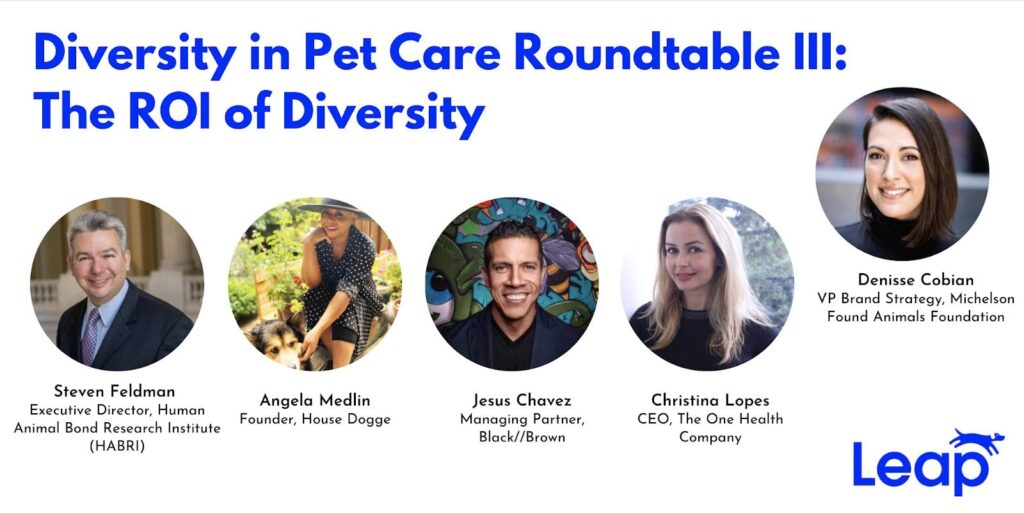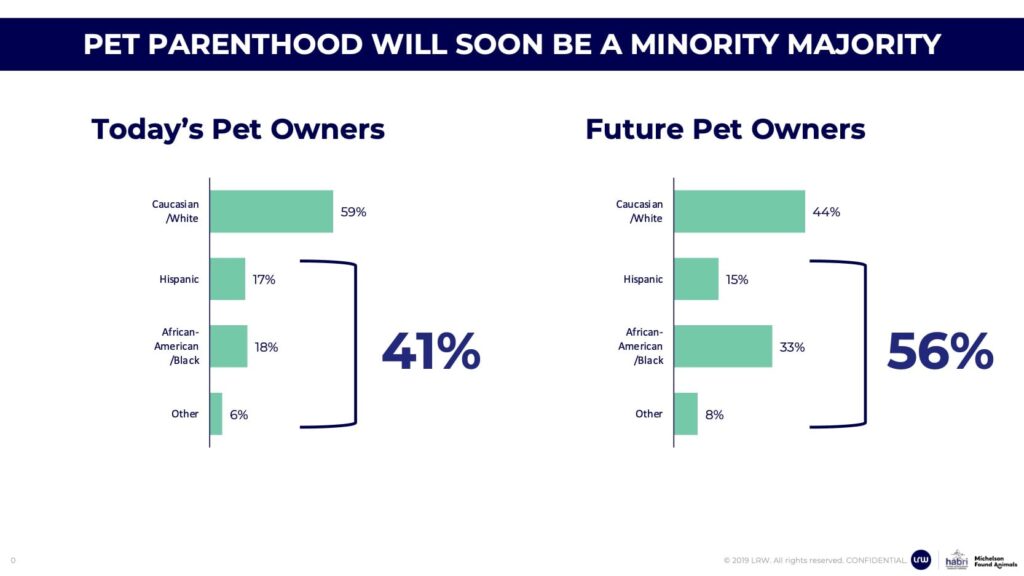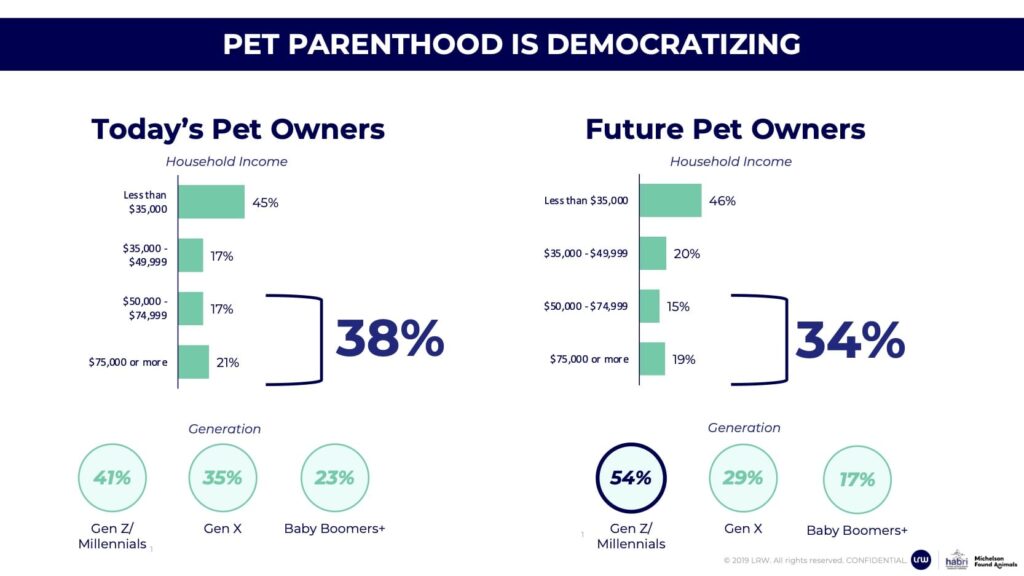The ROI of Diversity in Pet Care








“Pet parenthood is changing,” said Feldman. “Over 70% of households have pets, meaning that pet trends change at about the same pace as the American consumer.” He further noted that “Gen Z, in particular, is expected to increase their pet parenthood soon so we have to pay attention to that.” Feldman also specifically cites how research is starting to point to Gen Z potentially dealing with mental health issues more than previous generations, and how pets may play an increasing role in emotional support for them in particular.
Understanding the diverse and shifting pet parent consumer landscape is vital. And the application of this data to product strategies holds the key to short and long term success. The typical $75,000-plus urban millennial target can only take new brands so far.
“You have to meet your consumers where they are,” said Christina Lopes, CEO of The One Health Company. She cited how their flagship product Fido Cures, a cancer treatment for dogs, has built a team of customer service experts who regularly interact with a diverse set of pet parents. “They are trained to talk to pet parents at all levels of education and with varying access to specialists,” she says. The team also communicates directly with veterinarians to advocate for the patients. The Fido Cures team identified gaps in consumer education and advocacy varied among consumers, so they made their system accessible to a broader audience.
Product development rooted in responding to diverse consumer needs can help grow a brand’s addressable market, especially if diversity is viewed as a function of varying race/ethnicity, age, gender identity, income, education, geography, and more. From that position, startups can ask, “Is this product and pricing strategy truly inclusive? Who are we leaving behind? Could more inclusive design better serve, and grow my consumer base?”
The Farmer’s Dog offers a good example of inclusive pricing. Human grade dog food is excellent for all dogs, but not affordable at all household incomes. So the company launched a topper program (supplementing a dog’s kibble diet with a partial serving of their product) that allows consumers to scale their subscription by price point, allowing them the flexibility of a 50% topper, 25% topper, or full 100% switch to Farmer’s Dog-delivered food. This strategy broadened their addressable market and created an opportunity for interested but skeptical consumers to try their product at a palatable price point, then build their subscription when committed.
The experts also addressed the challenge of authentic marketing to diverse consumers. Although some marketers may feel diverse marketing can be a daunting undertaking, diverse marketing campaigns are critical to helping brands find and create broader consumer bases. Jesus Chavez, Managing Director of Black//Brown, gave valuable advice. “It’s not just about having different faces on your marketing team,” he said, “It’s about having diverse thoughts on your team. You want people who can look at a problem and a message differently and challenge each other.”
“It’s not just about having different faces on your marketing team. It’s about having diverse thoughts on your team.”
– Jesus Chavez, Managing Director of Black//Brown
The session covered diversity, product, marketing, and profits. That’s ok, because positive diversity practices aren’t just good ethics. They’re good business. Understanding our community’s spectrum of needs will help us better serve them. And that, in turn, will deliver the ROI we are seeking.
About Leap Venture Studio:
The Leap Venture Studio and Academy is a partnership between Michelson Found Animals and Kinship, a division of Mars Petcare. Together, the two companies represent the most innovative thinkers in the pet care industry. MFA & Kinship recognize the immense value of the pet care sector and want to foster innovation and growth from the bottom-up.
Many thanks to our panelists:
Jesus Chavez: Jesus Chavez is Managing Director of Black//Brown, a strategic advisory firm that helps companies navigate the intersection of digital and diversity. Chavez is a serial entrepreneur and advisor with deep understanding of digital operations, content marketing, social platforms, and business strategy. Previously, he was the Chief Executive Officer of Vertical Networks, the world’s leading mobile-first content studio, and Chief Operating Officer at mitú, a leader in creating digital media and entertainment for U.S.- based Latino millennials. Chavez is a Board Member on the Digital & Innovation Advisory Council for St. Jude’s Children’s Research Hospital.
Steven Feldman: Steven Feldman is the Executive Director of the Human-Animal Bond Research Institute (HABRI). His mission is to advance the science that demonstrates the positive roles that pets and other animals play in the integrated health of individuals, families, and communities. Feldman is an experienced public affairs advocate who has worked in the areas of wildlife conservation, animal welfare, healthcare, and education.
Christina Lopes: Christina Lopes, CEO of The One Health Company, is one of the few Female/Latina/Native American CEOs in the animal health industry. Prior to founding One Health, Lopes served on the Board of International Planned Parenthood. She also worked on a doctoral degree at Princeton University, studying under the tutelage of civil rights revolutionary Dr. Cornel West, and she earned a Masters in Sustainable Development at Columbia University, studying with Jeffrey Sachs. She has been recognized by the World Economic Forum in Davos as a Young Global Leader and the International Women’s Forum as a Rising Talent.
Angela Medlin is a former Nike design director who was inspired by her English Bulldog Wubbi and years of travel and design to found House Dogge, a modern, eco-friendly dog accessory brand. Her beautiful studio is based in Portland, Oregon, where House Dogge makes creative and sustainable dog accessories and clothing.
By Denisse Cobian, VP of Brand for Michelson Found Animals Foundation
How a better understanding of the diversity of the American consumer can build better products, implement better marketing, and drive increased profits for pet care startups.
For the past several weeks, the teams supporting Leap Venture Studios have been convening experts in the pet startup ecosystem to discuss equity, inclusion, and diversity in pet care. We discussed deeply important topics, including systemic racism, the need for greater diversity in pet care, and how to challenge our industry to do better with respect to diversity. Not only is this the right thing to do, there is another compelling reason: The undeniable positive return on investment (ROI) of diversity initiatives (full panel recording at this link).
Full disclosure: Before joining the Michelson Found Animals Foundation, I spent a decade in multicultural media, working in the trenches of the tough what have you done for me lately world of advertising sales. Most of my time was spent educating blue-chip brands, companies with eight- and nine-figure marketing budgets, about the benefits of connecting with diverse populations. It is not just good ethics – it is good for business. (And no, a Spanish-lanuage translation of a 30-second TV advertisement does not make a multicultural strategy.)
There is a new American reality. That reality is one of a diverse, intersectional consumer. The American population will be a minority majority by 2050. In fact, 12 of the top 15 Designated Market Areas are already in the minority majority status, and the entire under age 17 demographic is as well. Understanding this drives new business, innovative products, and higher profits. (Go ahead and take a minute to explore those aforementioned links.)
Our panelist Steve Feldman, executive director of the Human Animal Bond Research Institute (HARBI) highlighted how pet parents are getting younger, more diverse, and their income is democratizing (below, HABRI & Michelson Found Animals, Pet-Friendly Housing Report, 2019).



